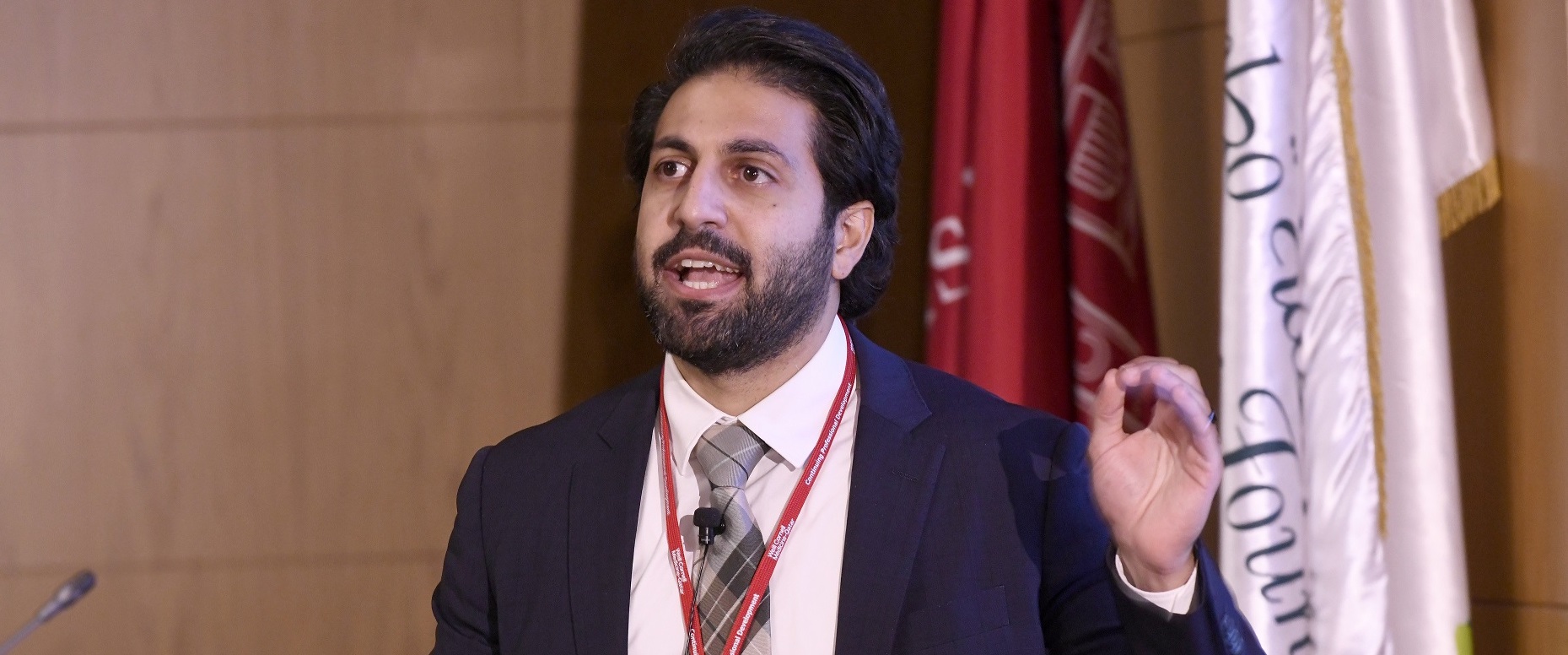WCM-Q Grand Rounds explores future of wearable tech in healthcare
 Dr. Mohamed B. Elshazly, Cardiologist and Assistant Professor of Medicine at WCM-Q, spoke about the potential for wearable technology to improve healthcare outcomes.
Dr. Mohamed B. Elshazly, Cardiologist and Assistant Professor of Medicine at WCM-Q, spoke about the potential for wearable technology to improve healthcare outcomes.
The emerging role of smart wearable devices to help prevent or manage cardiovascular disease was discussed at Weill Cornell Medicine-Qatar’s (WCM-Q) Grand Rounds.
Dr. Mohamed B. Elshazly, Cardiologist and Assistant Professor of Medicine at WCM-Q, explained how smartwatches that collect data such as activity levels, heart rate and blood pressure can be used to incentivize users to take more physical activity and reduce their risk of cardiovascular disease, and to help manage patients with existing cardiovascular disease.
Using sophisticated software, smartwatches analyze activity and heart rate data in conjunction with characteristics such as age, weight, height and sex to estimate the number of calories burned and individual cardiac fitness. Some smartwatches can detect an irregular heartbeat and prompt the user to take an electrocardiogram (ECG) test, also using the watch. The data can then be downloaded as a PDF for the user to take to their doctor. Very recently, wrist worn blood pressure monitors have received approval from the US Food & Drug Administration (FDA).
Dr. Elshazly, who is a graduate of WCM-Q, said: “More than half of US adults don’t get enough physical exercise and are at higher risk of cardiovascular disease. The question then is how can we use the data collected by smart wearables to improve cardiovascular outcomes?”
In answer to that question, Dr. Elshazly pointed to scientific studies which found that the activity feedback provided by smart wearables, when used in a ‘gamified’ scenario, appears to incentivize individuals to be more physically active. “The physical data activity that we get from our smartwatches can be used to enhance physical activity and hopefully improve cardiovascular outcomes in healthy individuals,” he said.
For individuals with existing cardiovascular disease, smartwatches can continuously monitor heart rate to detect arrhythmias, while the ECG function can be used to screen for abnormalities such as atrial fibrillation (AF), a type of irregular heartbeat that can lead to heart failure, blood clots, stroke and other complications. AF can present with symptoms such as feelings of weakness, fatigue, palpitations, dizziness and shortness of breath, but can also present asymptomatically, meaning smartwatches might be particularly useful for detecting it.
Having graduated from WCM-Q in 2010 with honors in academic achievement, Dr. Elshazly completed his residency in Internal Medicine at Johns Hopkins Hospital in Baltimore, one of the world’s most prestigious teaching hospitals. He then completed a fellowship in Cardiology and Cardiac Electrophysiology at the Cleveland Clinic in Cleveland. Dr. Elshazly is a biotech entrepreneur and co-founder of a startup that aims to revolutionize medical emergency response using crowdsourcing technologies in order to save lives and reduce healthcare costs. He returned to WCM-Q in 2017 to take up his current position.
The lecture was accredited locally by the Qatar Council for Healthcare Practitioners-Accreditation Department (QCHP-AD) and internationally by the Accreditation Council for Continuing Medical Education (ACCME).